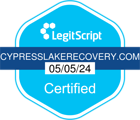Eating Disorders Treatment
When we think of addictive behaviors, we think of addictions like alcohol and drugs. But what about behavioral addictions, meaning addictions to behaviors or the things that we do obsessively without fail even though they cause us harm? At Cypress Lake Recovery, we associate addiction with any destructive behaviors or habits that take control of our patients’ lives. The same underlying principle applies to eating disorders and the unhealthy thought process that creates a dark space inside those affected. Eating disorders might begin as small things like dieting and exercise to get healthy and to lose weight, but they can quickly turn into obsessions. We hope to help patients suffering from these eating disorders, to offer them a safe place to address these destructive thought processes and find hope.
We can understand why these eating disorders develop when we see posters and magazines of unrealistically thin women, or men that are chiseled for days. These images in the media reinforce these ideals that both males and females reach for as they incessantly diet and exercise, but these media-driven ideas of what beauty is are far beyond the truth. Not only do they create a negative point of view for children, but adults adhere to this as well and grow to support these images as what’s healthy and not what is fiction. At Cypress Lake Recovery, we support the idea that everyone is unique and should be supported with love and warmth. The only way we can recover from eating disorders and other addictions is when we feel cared for and understood. To know what classifies an eating disorder, we will cover the main three categories we cover in therapy at Cypress Lake Recovery.

Classifying Eating Disorders
How eating disorder is defined is that it suggests a condition of the mind as it relates to eating habits that are unhealthy or abnormal. We further break down the various eating disorders that are known today as anorexia, bulimia, and binge-eating disorder.
Anorexia Nervosa
Patients that represent this class of eating disorder are dangerously under an average healthy weight, and they refuse to maintain a healthy weight even if a medical professional has directed it. Those with anorexia are blind to their rapidly declining health and continue to drop weight, convinced they are overweight. Anorexia nervosa patients are unable to eat balanced or nutritious meals, regularly watch calories and fear fatty foods. The health repercussions of anorexia are high and can cause permanent damage over time.
Symptoms of anorexia nervosa:
- Underweight or malnourished
- Distortion of self-image
- Hair loss or thinning hair
- Concern for brain damage
- Blood pressure changes and irregular heart rate
- Hypertrophy of the heart
- Loss of organ function
- Unhealthy relationship with food
- Acute fear of eating and gaining weight
- Decline of muscle mass, causing anemia and weakness
- Chronic fatigue
- Digestive issues
- Difficulty maintaining warmth
- Skin deterioration
- Loss of bone density
- Anxiety and depression
Contact Our Admissions Team Today
Bulimia
This disorder is the complete opposite of anorexia because those that binge eat often overeat all at once and suffer from weight gain. Our patients that suffer from bulimia are often overweight and have serious health problems because of this weight gain. However, the unhealthy relationship with food is difficult to overcome because they have the desire to lose weight but cannot due to binge-eating. There is no vomiting or serious exercise, but intense guilt comes with the overeating and pain.

Each of these eating disorders is based on negative or distorted images of the body. For some patients, this distortion of the body they see is fixated on and obsessed over until they can find ways to alter their bodies, whether they opt for surgery or some permanent modification. For those that opt for plastic surgery, they often try to resemble famous people or body types. There are women in the Ukraine that are known for their plastic surgery pursuits to resemble Barbie and her dimensions down to the waist size, large eyes, and tiny nose. This thought process can get worse with an eating disorder and turn into a concurring condition known as body dysmorphic disorder or BDD.
Testimonials
![]()
![]()
![]()
![]()
![]()
Regina
I am so happy that I chose Sabino to begin my recovery. I have suffered for years from depression, anxiety, panic disorder, and PTSD. The programs that are offered here at Sabino have been truly phenomenal in helping me recover. I also appreciated the professional staff that are here on duty 24/7, which helps create a safe environment. Cypress Lake Recovery uses effective “one on one” methods that meet each person’s individual needs because they evaluate and have a better understanding of your personal traumatic experiences. Thanks Sabino, I am truly grateful to you and the Sabino family.
![]()
![]()
![]()
![]()
![]()
J.A.
A beautiful facility! Staff sets the tone and kindness that residents easily follow. Thank you, Cypress Lake Recovery!
![]()
![]()
![]()
![]()
![]()
Pamela
The program at Cypress Lake Recovery works! I emerged from an accumulation of unrecognized emotions, issues of trust, and unresolved grief and loss. 35-days of effective integration of customized quality therapy reconnected my mind, body, spirit, and I am worth it! I had masked emotions and hurtful events for decades with alcohol. At Cypress Lake Recovery I safely focused deep within to unleash harmful secrets and self-degradation. Tools of recovery were practiced, not just presented. Integrative therapies were tailored to my circumstances, thus were effective. This residential program is like no other. For me, Cypress Lake Recovery delivered what was professed. I am forever grateful for this gift of healing.
![]()
![]()
![]()
![]()
![]()
Mike
Life changing experience. Wonderful staff. Wonderful program. Thanks for everything!
![]()
![]()
![]()
![]()
![]()
Darcy
It was great to begin my recovery in a group environment with so many knowledgeable nurses, therapists, BHT’s, and others around for support. The equine therapy, challenge course, family week, and daily therapies all work together seamlessly, allowing me to leave Sabino as a healthier and stronger person!
Symptoms of bulimia:
- Decaying teeth
- Dehydration
- Vitamin and mineral deficiency
- Vision issues
- Constipation
- Anxiety
- Reduced self-esteem
- Intestinal conditions involving soft tissue decay (esophagus, mouth)
- Inflammation
- Heart trouble
- Chronic headaches
- Menstrual issues
- Depression
- Binge-eating Disorder
Symptoms of binge-eating disorder:
- Weight gain (unhealthy BMI)
- Anxiety
- Heart disease
- Mood disorders
- Body-image disorders
- Ulcers
- Yo-yo dieting, frequently without results
- Stress
- Depression
- Chronic fatigue
- Self-esteem issues
- Overeating and stomach stress
- Digestion conditions
- Embarrassment when eating

We offer nutrition management, medical observation, and medication management as well as individual, and group therapies with other patients that suffer from the same conditions to help create a safe and comforting space for our patients. At Cypress Lake Recovery, we want to help you get back to your healthy self and to live without fear of embracing who you are. We teach love, motivation, and patience because recovery takes work to see the change happen. Call Cypress Lake Recovery today and rediscover self-love at 409-407-4976.
Nationally Recognized & Accredited







